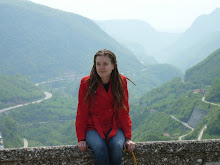
This is not the first book about Afghanistan and certainly not the first about women´s situation in a society ruled by shari´a. But that doesn´t make it any less relevant. I´ve grown up associating Kabul with missiles, Talibans, burquas and the massacre of the Buddhas of Bamyan, but it is important that we hear that before the soviets invaded it was a country where the women taught in universities, families took in the matinees in the local cinema and children played in the streets without fear.
This book is easily accessible for everyone, in its language and straightforward storyline. Khaled Hosseini writes with a love for his native land, that amid struggle and desperation, makes the hills of Herat and the streets of Kabul glow in the afternoon sun. And it makes me humble when I am reminded that even though I have an illness I think has cursed me unfairly, and this half-life of mine is in fact a mistake that soon will be corrected, many women spend their lives on stand-by, and then die without never being allowed to rise to their full potential.
Some people might opt out of reading this book because its been reviewed in every newspaper, climbed the top 10 lists everywhere and had big sums spent on creating a media hype around it and the preceding "The Kite Runner". But I think that if any piece of literature should enjoy just that, it is a book like this one. During the 90´s there was an urgency to highlight what the Nazis did to Europe, to make sure no one will forget and risk repeating history. Let this decade etch in our memories what the Talibans did; to Afghans, to religion and to the rest of the world. And then, maybe we can allow Allah to again become the forgiving god he once was.


 a href="http://www.facebook.com/people/Malin_Nafstadius/512731334" target="_TOP" title="Malin Nafstadius's Facebook profile">
a href="http://www.facebook.com/people/Malin_Nafstadius/512731334" target="_TOP" title="Malin Nafstadius's Facebook profile">
No comments:
Post a Comment